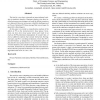Free Online Productivity Tools
i2Speak
i2Symbol
i2OCR
iTex2Img
iWeb2Print
iWeb2Shot
i2Type
iPdf2Split
iPdf2Merge
i2Bopomofo
i2Arabic
i2Style
i2Image
i2PDF
iLatex2Rtf
Sci2ools
DSN
2008
IEEE
2008
IEEE
Analysis and solutions to issue queue process variation
The last few years have witnessed an unprecedented explosion in transistor densities. Diminutive feature sizes have enabled microprocessor designers to break the billion-transistors per chip mark. However various new reliability challenges such as Process Variation (PV) have emerged that can no longer be ignored by chip designers. In this paper, we provide a comprehensive analysis of the effects of PV on the microprocessor’s Issue Queue. Variations can slow down issue queue entries and result in as much as 20.5% performance degradation. To counter this, we look at different solutions that include Instruction Steering, Operand- and Port- switching mechanisms. Given that PV is non-deterministic at design-time, our mechanisms allow the fast and slow issue-queue entries to co-exist in turn enabling instruction dispatch, issue and forwarding to proceed with minimal stalls. Evaluation on a detailed simulation environment indicates that the proposed mechanisms can reduce performance
Related Content
| Added | 29 May 2010 |
| Updated | 29 May 2010 |
| Type | Conference |
| Year | 2008 |
| Where | DSN |
| Authors | Niranjan Soundararajan, Aditya Yanamandra, Chrysostomos Nicopoulos, Narayanan Vijaykrishnan, Anand Sivasubramaniam, Mary Jane Irwin |
Comments (0)

